<< Previous | Displaying results 4471-4480 of 6776 for "" | Next >>
The Junkers (Ju) 87, known as the "Stuka," spearheaded the Blitzkrieg ("lightning war") attacks that were decisive in the western campaign in 1940. Stuka dive-bombers closely supported German ground forces. They destroyed enemy strong points, aircraft, and airfields, and spread panic in rear areas. Although slow and easily shot down by Allied fighters, the Stukas proved devastatingly effective in the German invasions of Poland and western Europe, where Germany enjoyed superiority in the air. Stukas caused…
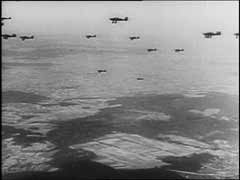
The German ship SS "St. Louis" departed from Hamburg for Cuba with almost 1,000 Jewish refugees on board on May 13, 1939. Most of the passengers had Cuban landing certificates. However, the Cuban government invalidated the certificates. When the "St. Louis" reached Havana on May 27, most of its passengers were denied entry. After the United States also refused to accept the refugees, the ship returned to Europe, docking at Antwerp. Britain, France, Belgium, and the Netherlands then agreed to accept the…
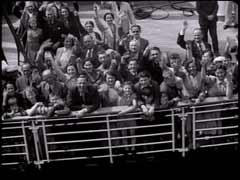
Roma (Gypsies) celebrate with music, dancing, and singing in the mountains near Zagreb, Yugoslavia. During World War II, Roma in Yugoslavia were exterminated by Croatian nationalists and by the Germans.
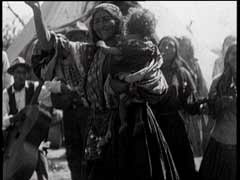
In July 1947, 4,500 Jewish refugees left displaced persons camps in Germany and boarded the "Exodus 1947" in France. They attempted to sail to Palestine although they did not have permission from British authorities to land. The British intercepted the ship and forcibly returned the Jewish refugees to Germany. Here, Jews from the "Exodus 1947" are confined in Poppendorf, Germany. The plight of the "Exodus" passengers became a symbol of the struggle for open Jewish emigration to Palestine.
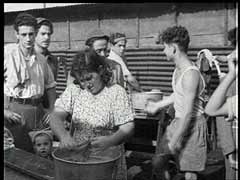
In July 1947 in France, 4,500 Jewish refugees from displaced persons camps in Germany boarded the "Exodus 1947" and attempted to sail (without permission to land) to Palestine, which was under British mandate. The British intercepted the ship off the coast and forced it to anchor in Haifa, where British soldiers removed the Jewish refugees. After British authorities failed to force France to accept the refugees, the refugees were returned to DP camps in Germany. The plight of the "Exodus" passengers became…
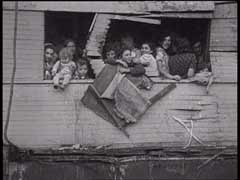
In July 1947, 4,500 Jewish refugees left displaced persons camps in Germany and boarded the "Exodus 1947" in France. They attempted to sail to Palestine without, however, having British permission to land. The British intercepted the ship and forcibly returned the refugees to Germany. This footage shows a protest in the Bergen-Belsen displaced persons camp in the British occupation zone of Germany. The protesters denounced British treatment of the "Exodus 1947" passengers. The plight of the "Exodus"…
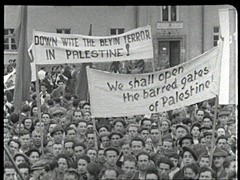
France signed an armistice with Germany on June 22, 1940, recognizing the right of German authorities to oversee the French administration. Further, German military authorities held jurisdiction over matters of internal security. In this footage, a German military court in Paris tries French citizens charged with resisting measures of the military occupation. Despite harsh military justice, the Germans could not quell opposition in France, and resistance activities would reach a peak during the Allied…

Czech resistance fighters attacked Reinhard Heydrich, acting governor of the Protectorate of Bohemia and Moravia, in an ambush near Prague in May 1942. Heydrich died of his wounds on June 4, 1942. In retaliation for the attack, the Germans destroyed the village of Lidice on June 10, 1942. The Germans shot all the men in the village and deported most of the women and children to camps in Germany. This footage shows destroyed homes and German officials inspecting the remains of the village.
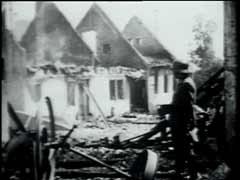
At his hidden headquarters in the mountains of Yugoslavia, Marshal Tito (Josip Broz), head of the Yugoslav Communist partisan movement, prepares his forces for battle. Women gather silk parachutes, used to drop supplies by Allied forces, for use as bandages. Partisans train, preparing to fight the Germans. At the height of the partisan war in Yugoslavia in 1943, Tito's partisans engaged some 35 Axis divisions, which otherwise might have been in service on the Italian or eastern fronts.
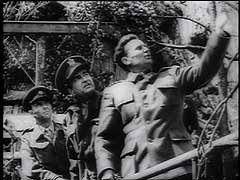
Germany invaded the Netherlands on May 10, 1940. Four days later, German planes bombed Rotterdam. The Germans tried to halt the raid on the city because Dutch authorities had agreed to negotiate the surrender of their country. However, a communications failure delayed the order halting the attack. The bombing destroyed much of the city center, leaving almost 80,000 people homeless. The Netherlands surrendered just a few hours later. On May 15, in retaliation for the bombing of Rotterdam, the British air…
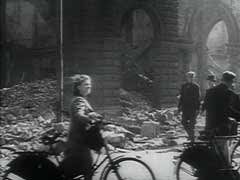
We would like to thank Crown Family Philanthropies, Abe and Ida Cooper Foundation, the Claims Conference, EVZ, and BMF for supporting the ongoing work to create content and resources for the Holocaust Encyclopedia. View the list of donor acknowledgement.